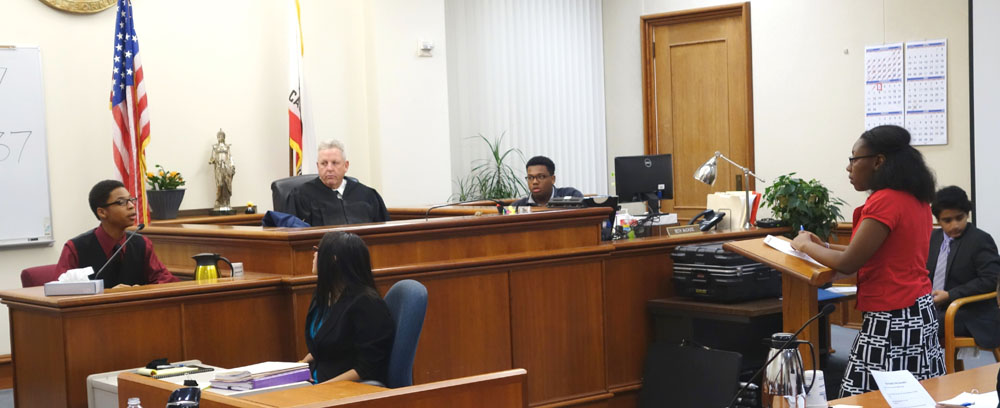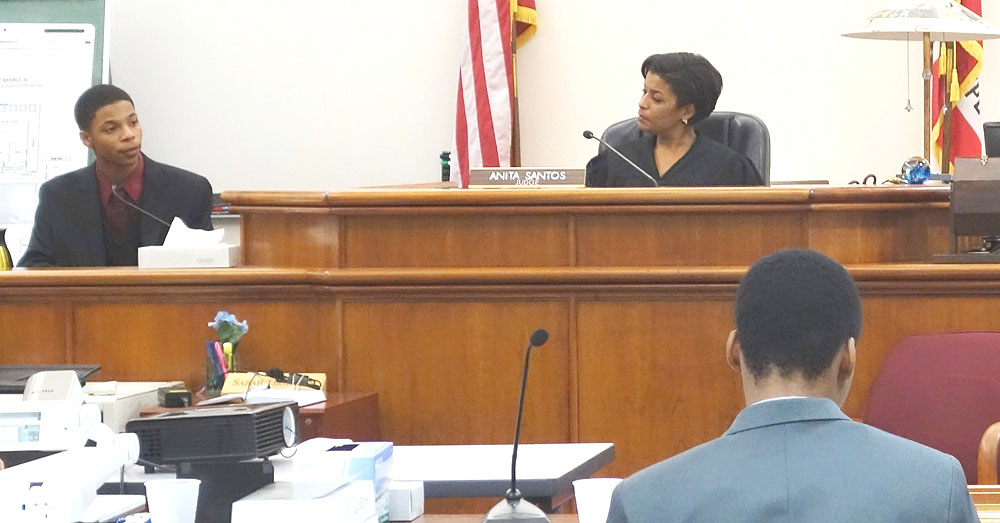Mock Trial: A Short Program with a Long-Term Impact

For a few evenings and Saturdays every January and February, Contra Costa County’s A.F. Bray Courthouse hosts a different crowd from the usual court attendees: teams of high school students from around the county converge to compete by presenting criminal mock trials before real judges. This is the culmination of five months of preparation, during which legal professionals coach the students in trial skills and procedures in after-school sessions a couple of days per week.
This Mock Trial Program is sponsored by The Constitutional Rights Foundation. Locally, the Contra Costa County Office of Education coordinates the annual program which is now in its 42nd year and requests county high schools and other youth programs to participate.
Each student takes on a role (or two) – attorney, witness, clerk, or bailiff – and their coaches guide them in preparing their side of the case. A pretrial motion, covering an area of constitutional law, is also included in the competition. Win or lose, the students are always excited to experience a realistic courtroom environment, and proud of their accomplishment.
Mock trials are an engaging and authentic way for students not only to learn about the legal system and careers within it, but also to develop persuasive argumentation skills, public speaking skills, teamwork abilities, and self-confidence.
In addition to competitive settings, mock trials are also sometimes used as a technique by teachers in a regular classroom, and as part of broader educational programs, such as the Summer Legal Fellowship Program sponsored by Center for Youth Development through Law.

Mock trial programs have a particularly strong impact on students from more under-resourced communities. Those students generally have fewer enrichment opportunities, and they can sometimes feel stigmatized based on where they live or which schools they attend. Participating in a rigorous academic setting provides them with validation of their capabilities. It fosters higher academic aspirations, as well as the skills and attitudes needed to achieve those aspirations.
The legal profession needs more individuals from first-generation and marginalized backgrounds, and this is a powerful way to inspire and prepare young people from those backgrounds to pursue these careers.
To help convey the impact of mock trial, a few former and current participants from schools in the Richmond area agreed to share their perspectives; our correspondents are:
Imani Barnes, a senior at UCLA, preparing to apply to law school. She participated in Mock Trial at De Anza High School for two years.
Alexandro Moya, Emergency Medical Technician. He participated in Mock Trial at Richmond High School for two years.
Marcos Nuñez, Information Technology professional. He participated in Mock Trial at Richmond High School for two years.
Anahi Ruiz Moncada, ninth grade student at Kennedy High School in Richmond. She took on the role of defense attorney in her first year of mock trial this past year.
Can you share what it was like participating in Mock Trial? How did you benefit?
Imani: “I gained a higher level of comfort with public speaking which was (and still is) very difficult for me. I also developed better critical thinking skills when having to use evidence to tell a compelling story in competition, and by modifying and improving the strength of our case as the competition progressed.”
Alexandro: “I remember having a great experience in the program. I learned how important it was to represent yourself in a professional manner. I also learned a lot regarding how to develop a plan with a team of people I have never worked with before, such as dividing the work of the mock trial with different students.”
Anahi: “I loved my time in Mock Trial. I benefited from participating by getting practice with what it’s like to be a lawyer (one of my career ambitions), and I got the chance to connect with others while doing what I love.”
What was your biggest challenge within Mock Trial?
Marcos: “I was extremely nervous to go up to the stand as a witness in my first year of mock trial. However, I received a lot of encouragement as well as constructive feedback on how I can improve. When I returned in my senior year, I was eager to be a lawyer and was able to do the opening statement and witness questioning. While I was still nervous, I was able to overcome it a lot easier. I still think back to these days and have encouraged others to get out of their comfort zone.”
Do you feel participating in Mock Trial still has an impact on your life today?
Imani: “Mock trial was one of the things that made me commit to becoming a lawyer and now, four years later, the confidence that I had back then has remained as I complete my undergrad degree and prepare to apply to law schools this fall!”
Alexandro: “I still use a lot of the skills such as public speaking and communication now that I am working in the field of Emergency Medical Services. As a first responder, I am glad to have developed these skills which help me engage with the community.”
Marcos: “It’s been ten years since I first attended my first mock trial session. I met amazing mentors that I am still in contact with today. I gained the confidence to speak publicly and interviewing skills, which I now use daily as a manager of a team. I also gained a much better understanding of how our government works (better than the traditional high school classes).”
Anahi: “I noticed the impact of Mock Trial in other areas of my life, via my motivation to do other things. Working on a case dealing with a victim of domestic violence made me more interested in seeing other types of oppression that women face, and that led me to writing an essay on medical malpractice specifically on pregnant women of color.”
Can you help inspire the next generation of lawyers and community leaders? Part-time opportunities, both paid and volunteer, are available during the school year and the summer. Judges and scorers are needed for the competition each January/February. Financial support is also needed to make sure these programs can continue.
To learn more, contact Nancy Schiff, Executive Director at the Center for Youth Development through Law, affiliated with the UC Berkeley School of Law, at nschiff@youthlawworks.org.